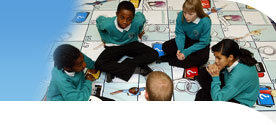



The revision of the key stage 3 programme of study provides an opportunity to review and refresh your sequences of work.
When reviewing planning across the key stage, developing new sequences of work or revising existing ones, you should consider the following.
Planning needs to highlight how the key concepts are integrated into teaching and learning across the key stage. When you review your planning you may find that the opportunities to develop understanding about democracy and justice, rights and responsibilities, and identities and diversity become connected through the issues or problems explored. However, it is important to ensure that understanding is developed in each concept and that pupils make sense of the concepts through concrete examples. Applying the concepts to different topical issues and in a range of contexts (local, national, global), will reinforce conceptual understanding.
When pupils revisit the key processes at different points in the key stage there needs to be a clear increase in demand to ensure that they continue to be challenged and progress. Planning should not only develop pupils' ability to debate, argue and take action in an informed way, but also their ability to adapt their techniques and strategies to a widening range of contexts and purposes with increasing independence. It should also develop their confidence to try out new roles or ideas and the sources they use in enquiries should be increasingly complex and challenging.
These activities should be assessed both formally and informally to ensure pupils are given feedback on how to improve and meet the expected standard by the end of the key stage. Teaching of the key processes needs to take account of pupils' experiences at key stage 2 to link with and build on their previous learning.
Pupils should be given the chance to communicate, represent and take action with others in both the school and wider community. Activities or sequences of work involving contact with groups, organisations and individuals in the local community are an important way to achieve this. ICT, such as the internet, PDAs (hand-held computers) and webcams offer direct opportunities to engage with audiences in different communities, both within the UK and internationally.